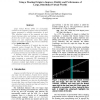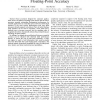64 search results - page 1 / 13 » Designing floating codes for expected performance |
TIT
2010
12 years 11 months ago
2010
Floating codes are codes designed to store multiple values in a Write Asymmetric Memory, with applications to flash memory. In this model, a memory consists of a block of n cells, ...
CW
2005
IEEE
13 years 6 months ago
2005
IEEE
Large Virtual Worlds (VWs) are increasingly common in the computer graphics areas of simulation, games, geospatial or scientific visualisation. In such VWs, simulated motion of th...
WOTUG
2008
13 years 6 months ago
2008
Most motion control systems for mechatronic systems are implemented on digital computers. In this paper we present an FPGA based solution implemented on a low cost Xilinx Spartan I...
ARITH
2003
IEEE
13 years 10 months ago
2003
IEEE
Decimal arithmetic is the norm in human calculations, and human-centric applications must use a decimal floating-point arithmetic to achieve the same results. Initial benchmarks i...
CAL
2007
13 years 4 months ago
2007
Abstract—Some processors designed for consumer applications, such as Graphics Processing Units (GPUs) and the CELL processor, promise outstanding floating-point performance for ...


